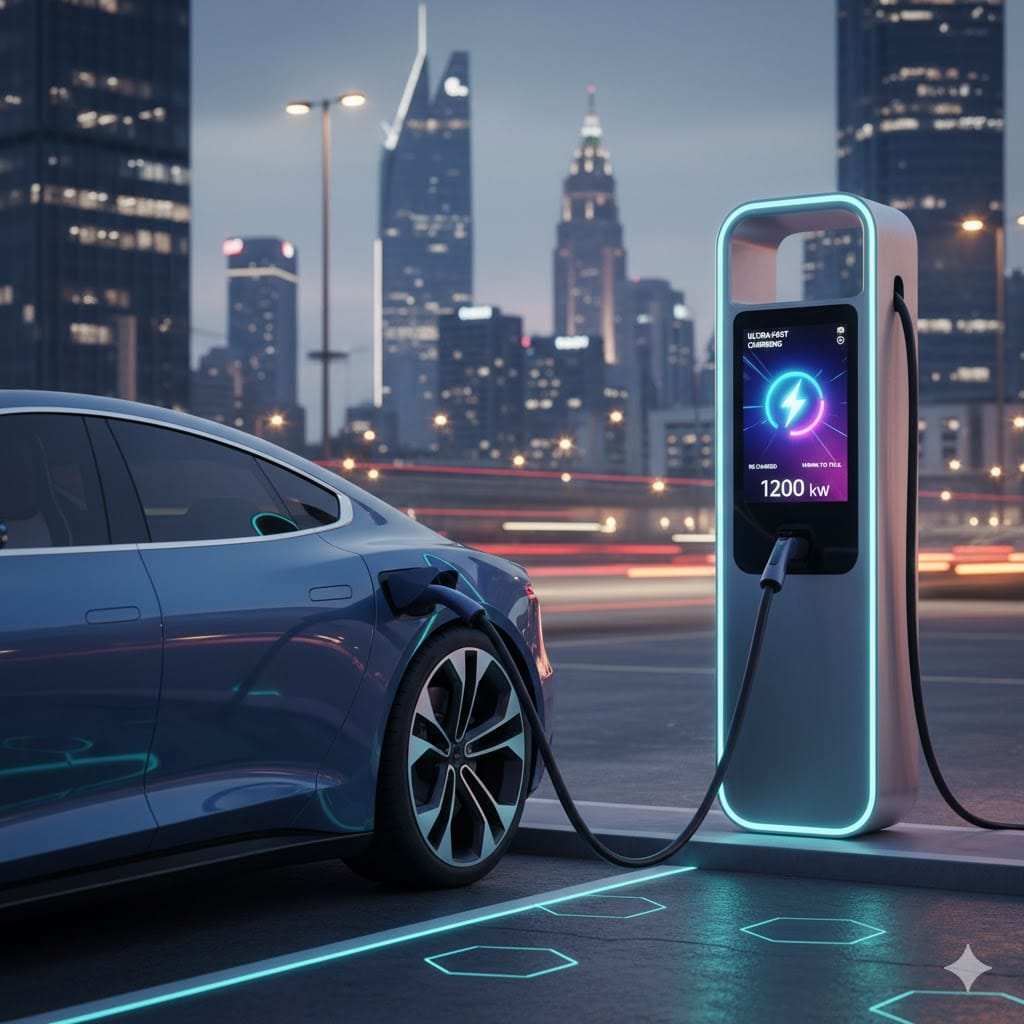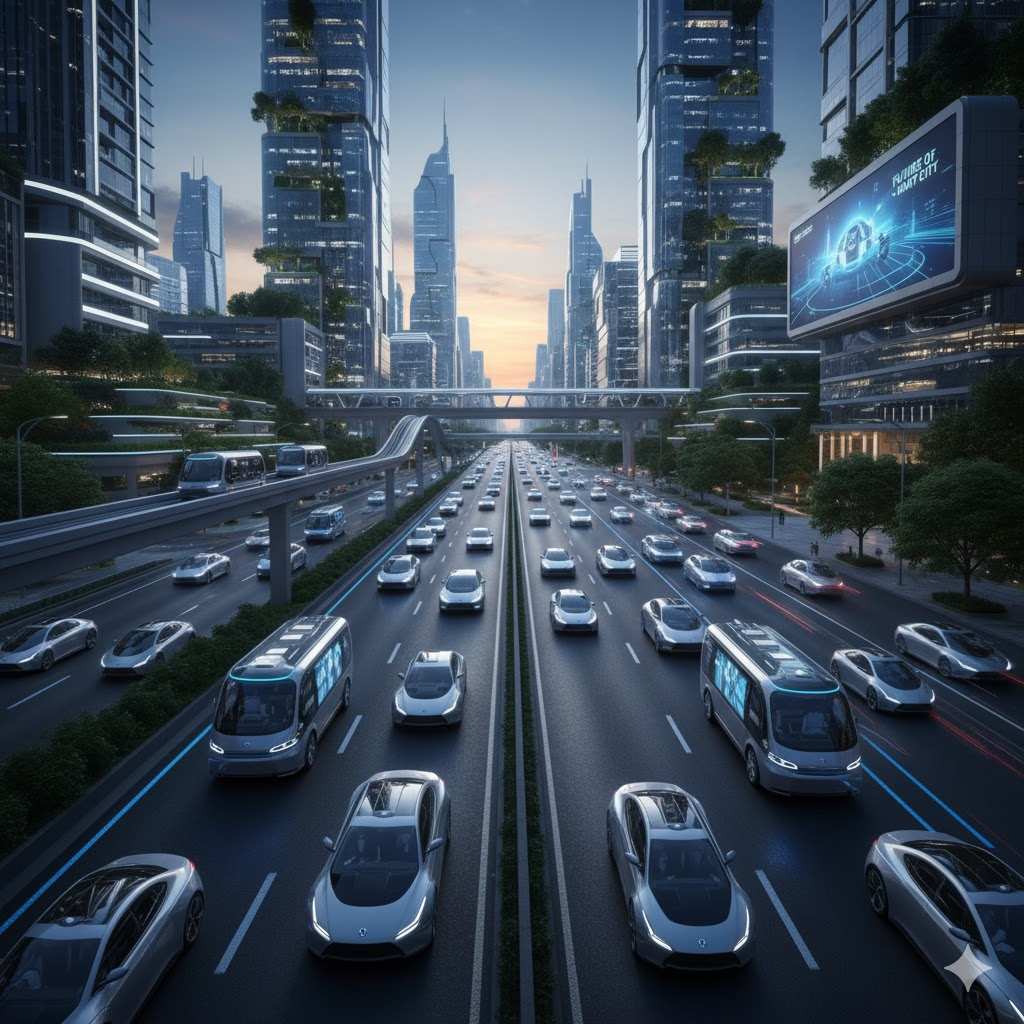Dubai has never been a city to follow trends—it creates them. As the world races toward sustainable transportation, this emirate is positioning itself at the forefront of a mobility revolution that promises to reshape how we think about travel, tourism, and urban living.
At GH Trips Dubai, we’re witnessing firsthand how these technological leaps are transforming the travel experience. The transition isn’t just about swapping combustion engines for batteries; it’s about reimagining the entire journey through one of the world’s most innovative cities.
The Vision: Dubai’s 2030 Mobility Strategy

Dubai’s leaders have set an audacious target: by 2030, 25% of all transportation trips in the city will be autonomous. This isn’t merely aspirational rhetoric—it’s a carefully orchestrated roadmap backed by substantial investment and infrastructure development.
The Dubai Autonomous Transportation Strategy encompasses everything from self-driving taxis and buses to delivery vehicles and emergency services. The projected benefits are staggering: a reduction of 44% in transportation costs, savings of AED 22 billion in economic costs annually, and a 12% increase in transportation efficiency.
For visitors exploring Dubai with GH Trips Dubai, this means a future where your hotel-to-attraction journey might be handled by an AI-powered vehicle that knows the optimal route, avoids congestion in real-time, and delivers you to your destination with unprecedented precision.
Electric Revolution: Charging Ahead
Dubai’s commitment to electric vehicles extends far beyond government mandates. The emirate has been systematically building one of the region’s most comprehensive EV charging networks, with hundreds of stations already operational across key areas.
The Dubai Electricity and Water Authority (DEWA) has launched the EV Green Charger initiative, installing fast-charging stations at shopping malls, hotels, public parking facilities, and tourist destinations. This infrastructure backbone ensures that electric mobility isn’t just feasible—it’s convenient.
Major luxury hotels where GH Trips Dubai arranges accommodations now feature dedicated EV charging facilities, allowing environmentally conscious travelers to maintain their commitment to sustainability even while vacationing. Tesla Superchargers dot the landscape alongside local charging networks, creating an ecosystem that supports every brand of electric vehicle.
Autonomous Technology: From Concept to Street Reality
Walk through certain areas of Dubai today, and you might encounter something straight out of science fiction: autonomous pods gliding silently along designated routes, carrying passengers without a human driver in sight.
The Roads and Transport Authority (RTA) has already deployed autonomous vehicles in several pilot programs. The JBR Beach area has seen autonomous shuttles ferrying beachgoers, while Dubai Silicon Oasis features self-driving vehicles as part of its smart city infrastructure.
These aren’t distant promises—they’re current realities being refined and expanded. The technology learns from every journey, becoming progressively more sophisticated in handling Dubai’s unique driving environment, from sudden sandstorms to the organized chaos of rush hour traffic.
Smart Mobility Hubs: The Integration Game


What truly sets Dubai apart is its holistic approach to smart mobility. Rather than viewing autonomous vehicles, electric cars, metro systems, and traditional transportation as competing options, Dubai is weaving them into an integrated tapestry.
Smart mobility hubs are emerging across the city where travelers can seamlessly transition between transportation modes. Imagine departing your hotel in an electric autonomous shuttle, connecting to the Dubai Metro at a hub equipped with real-time information displays, and then completing your journey via e-bike rental—all coordinated through a single mobile application.
GH Trips Dubai is adapting our tour packages to leverage these integrated systems, offering visitors transportation experiences that showcase Dubai’s technological sophistication while ensuring comfort and efficiency.
Environmental Impact: Beyond Carbon Reduction
The shift toward electric and autonomous vehicles delivers environmental benefits that extend beyond the obvious carbon emission reductions. Electric vehicles produce zero tailpipe emissions, directly improving air quality in a city where outdoor activities and desert adventures are major tourist attractions.
Autonomous vehicles, through optimized routing and coordinated traffic flow, can reduce congestion by up to 40%. Fewer vehicles idling in traffic means less pollution, less wasted fuel, and more pleasant urban environments. For a destination city like Dubai, where first impressions matter tremendously, cleaner air and quieter streets enhance the visitor experience in measurable ways.
Dubai’s summer temperatures, which can soar above 45°C, have historically made outdoor exploration challenging. However, the transition to electric vehicles eliminates the heat radiating from traditional combustion engines, creating marginally cooler urban microclimates—small improvements that compound across millions of vehicle interactions.
The Tourist Experience: Reimagined Journeys
For international visitors booking with GH Trips Dubai, the emerging smart mobility ecosystem presents exciting possibilities. Autonomous tour vehicles could offer narrated journeys through Dubai’s iconic locations, with AI systems providing multilingual commentary perfectly synchronized to passing landmarks.
Electric luxury vehicles are becoming the preferred choice for VIP airport transfers and premium city tours. The whisper-quiet cabins allow for business calls or relaxed conversation, while the instant torque of electric motors delivers a driving experience that feels both powerful and refined.
Several high-end hotels have partnered with electric vehicle manufacturers to offer guest experiences centered around sustainable luxury. Guests can request Tesla Model S vehicles for city exploration or experience autonomous pods for short-distance hotel campus transportation.
Challenges on the Road Ahead
Despite rapid progress, Dubai’s smart mobility transformation faces genuine obstacles. The extreme heat tests battery performance and longevity in ways that temperate climates don’t. Engineers must design cooling systems that can maintain optimal battery temperatures while maximizing range efficiency.
The initial infrastructure investment is substantial. While charging stations are proliferating, comprehensive coverage across all areas of the emirate requires continued capital deployment. Autonomous vehicle technology, though advancing rapidly, still requires human oversight in many situations, limiting immediate full-scale deployment.
Cultural adaptation presents another consideration. Many UAE residents have deep attachments to luxury combustion-engine vehicles as status symbols. Shifting preferences toward electric alternatives requires not just technological superiority but also careful positioning that preserves the aspirational appeal of automotive ownership.
Fleet Transformation: Leading by Example

Dubai’s government entities are spearheading adoption through their own fleets. The RTA has committed to converting a significant portion of its taxi fleet to hybrid and electric vehicles, with targets for fully autonomous taxis by 2030.
Major car rental companies operating in Dubai have begun introducing electric vehicle options, allowing tourists to experience EV technology firsthand. GH Trips Dubai partners with providers offering Tesla and other premium electric models for clients who want to explore the city sustainably without compromising on comfort or performance.
Police and emergency services have also begun integrating electric vehicles, including the attention-grabbing addition of electric supercars to Dubai Police’s fleet—a characteristically Dubai approach to promoting new technology through spectacle and aspiration.
Innovation Districts: Testing Grounds for Tomorrow
Areas like Dubai Silicon Oasis and Mohammed Bin Rashid City function as living laboratories where smart mobility concepts are tested and refined. These districts feature dedicated lanes for autonomous vehicles, comprehensive charging infrastructure, and integrated traffic management systems that preview the city-wide future.
Visitors staying in these areas through GH Trips Dubai arrangements get early exposure to transportation technologies that remain years away from mainstream deployment elsewhere. It’s tourism that doubles as a glimpse into the future—an experience increasingly sought by tech-savvy travelers.
The Economic Equation: Costs and Opportunities
The economics of electric and autonomous vehicles in Dubai’s tourism sector present intriguing possibilities. While initial vehicle costs remain higher for EVs, operational expenses are significantly lower. Electricity costs less than gasoline, maintenance requirements decrease dramatically without complex combustion systems, and vehicle longevity typically exceeds traditional alternatives.
For tour operators like GH Trips Dubai, these economics matter. Lower per-kilometer operational costs could translate to more competitive pricing or enhanced profit margins. The marketing value of offering “fully electric Dubai tours” or “autonomous vehicle experiences” adds intangible value that attracts environmentally conscious travelers.
Dubai’s government has implemented incentives accelerating adoption, including reduced registration fees for electric vehicles, free parking at public facilities, and exemptions from Salik (toll) charges. These policies artificially improve the economic equation during the transition period, encouraging early adoption that builds the critical mass necessary for market transformation.
Connected Infrastructure: The Digital Foundation
Smart mobility requires smart infrastructure. Dubai is embedding sensors, cameras, and communication systems throughout its road network, creating a digital nervous system that autonomous vehicles can tap into for real-time information.
Traffic signals communicate with approaching vehicles, optimizing flow patterns. Parking facilities broadcast availability, eliminating the circular searching that wastes time and fuel. Road conditions, accident reports, and construction updates feed into navigation systems instantly.
This connected infrastructure transforms individual autonomous vehicles into nodes within a larger intelligent transportation network. The whole becomes greater than the sum of its parts, with system-wide efficiency gains that benefit everyone on the road—autonomous or human-driven, electric or combustion, tourist or resident.
Training and Workforce Development
Dubai’s smart mobility transformation creates demand for new skillsets. Technicians must learn battery systems, electric drivetrains, and autonomous vehicle diagnostics. Traffic management professionals require training in AI-optimized flow patterns and connected vehicle systems.

Educational institutions across the emirate are developing curricula addressing these needs. Partnerships with global automotive manufacturers bring expertise and training resources. For a tourism economy, workforce readiness ensures that when your electric vehicle needs service or your autonomous tour experiences a technical hiccup, qualified professionals can respond promptly.
GH Trips Dubai invests in team training to help our staff understand these emerging technologies, ensuring we can guide clients effectively and troubleshoot issues when they arise.
Regional Leadership: Setting the Standard
Dubai’s smart mobility initiatives position it as a regional leader, potentially establishing technical standards and best practices that neighboring emirates and GCC countries might adopt. This leadership role attracts international investment, technology partnerships, and the global attention that reinforces Dubai’s brand as an innovation hub.
For tourism, this reputation matters enormously. Travelers increasingly seek destinations that represent the future, not just the past. Dubai’s smart mobility ecosystem becomes part of the destination’s appeal—a reason to visit, not merely a means of getting around once you arrive.
The 2030 Horizon: Imagining the Experience
Picture yourself arriving in Dubai in 2030. An autonomous electric shuttle awaits at the airport, summoned through your GH Trips Dubai travel app. The vehicle recognizes you through facial recognition, adjusts climate controls to your preferences stored in the cloud, and begins a personalized journey to your hotel.
The ride is silent except for the AI assistant providing insights about passing landmarks in your preferred language. The vehicle coordinates with traffic management systems, never encountering a red light thanks to optimized routing. Your luggage, tracked by IoT sensors, arrives separately via autonomous delivery vehicle.
Throughout your stay, transportation becomes invisible—always available, never requiring thought or planning. You simply indicate your desired destination, and the mobility network handles the rest, selecting optimal vehicles and routes based on real-time conditions, your schedule, and your preferences.
This isn’t fantasy. It’s the logical extension of initiatives already underway, systems already being tested, and infrastructure already under construction.
Why It Matters for Travelers
The smart mobility revolution transforming Dubai delivers tangible benefits for visitors:
Time savings: Optimized routing and reduced congestion mean more time experiencing attractions and less time stuck in traffic.
Cost efficiency: Shared autonomous vehicles and electric transportation options offer premium experiences at accessible price points.
Environmental responsibility: Travelers can maintain their sustainability commitments without sacrificing comfort or convenience.
Unique experiences: Autonomous vehicle tours and electric supercar rentals provide stories worth sharing—experiences available in few other destinations.
Safety: Autonomous systems eliminate human error, potentially reducing accident rates and creating safer travel conditions.
Accessibility: Autonomous vehicles with specialized accommodations can offer improved mobility options for travelers with disabilities.
Getting Ahead of the Curve with GH Trips Dubai
At GH Trips Dubai, we’re not waiting for the smart mobility future to arrive—we’re actively shaping how it enhances the visitor experience. Our team stays current with the latest developments, testing new services as they launch and integrating proven technologies into our tour packages.
We offer consultation services helping travelers understand their electric and autonomous vehicle options in Dubai. Whether you’re interested in renting a Tesla for independent exploration, booking an autonomous vehicle tour, or simply ensuring your hotel offers EV charging facilities, our expertise ensures you experience Dubai’s transportation revolution firsthand.
Our partnerships with forward-thinking hotels, transportation providers, and technology companies give GH Trips Dubai clients early access to emerging mobility services. You won’t just read about Dubai’s smart transportation future—you’ll experience it, creating memories and stories that distinguish your Dubai journey from conventional tourism.
Conclusion: The Road Ahead
Dubai’s roadmap to smart mobility represents more than technological adoption—it’s a fundamental reimagining of how a modern city moves. Electric and autonomous vehicles are merely the visible manifestations of a deeper transformation toward integrated, sustainable, intelligent urban systems.
For visitors, this evolution promises Dubai experiences unlike anywhere else in the world. The combination of cutting-edge technology, luxury-focused implementation, and rapid adoption timelines creates opportunities to interact with the future of transportation years before it becomes commonplace elsewhere.
As Dubai accelerates toward its 2030 goals, the gap between vision and reality continues narrowing. The autonomous shuttles, electric vehicle fleets, and smart charging infrastructure aren’t distant promises—they’re today’s reality being refined into tomorrow’s seamless system.
GH Trips Dubai remains committed to helping travelers navigate this transformation, ensuring your Dubai experience showcases the city’s innovation while delivering the comfort, convenience, and memorable moments you expect from a world-class destination.
The road to Dubai’s smart mobility future is electric, autonomous, and accelerating. The only question is: are you ready to experience it?
Ready to experience Dubai’s transportation revolution? Contact GH Trips Dubai today to design a tour package that showcases the emirate’s smart mobility initiatives alongside its iconic attractions. Let us guide you through the future of travel—available now in Dubai.
